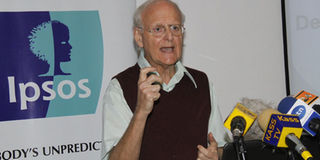When will Wanjiku take centre stage?

Ipsos Synovate lead researcher Dr Tom Wolf addressing a media briefing on the latest social, political, economic and cultural barometer survey on September 19, 2014. The polls confirm that ethnicity and party loyalty are the determining factors in whether you support the Okoa Kenya Movement or not. PHOTO| JEFF ANGOTE
What you need to know:
- There is little doubt that the political class reluctantly supported the 2010 referendum, but this time around they are not going to allow civil society to outwit them
- Pokot, Turkana, Wajir, and Mandera in fact the whole of the former Northern Frontier Districts are experiencing services that they had been deliberately and systematically deprived of by successive administrations
- Yet, devolved funds can be increased if the country and counties learn to live within their means and if wastage and corruption is severely reduced
We have had two opinion polls on the proposed referendum and the results are hardly encouraging.
The polls confirm that ethnicity and party loyalty are the determining factors in whether you support the Okoa Kenya Movement or not.
Up to 90 percent of voters in Nyanza support the referendum while a similar figure in Central oppose it. Support for amending or opposing is consistently on a par with the popularity of the coalitions in any given region.
Maybe matters will crystallise with time, but right now politics reigns, sobriety is missing and Wanjiku is once again the victim.
There is little doubt that the political class reluctantly supported the 2010 referendum, but this time around they are not going to allow civil society to outwit them.
The positions of both coalitions reflect their immediate interests and not ours.
REFORMS
The issues needing reform also seem to be increasing by the day, so now we seem headed for a major constitutional review rather than a simple referendum on one or two issues.
Where does that leave Wanjiku? Well one poll indicated her major concern is the cost of living.
How that can be related to a constitutional amendment seems remote, but it does remind us wananchi are feeling the pinch and that you cannot eat a constitution.
Yet devolution is here to stay and has gained tremendous popularity in counties that for half a century were neglected by the Nairobi government.
Pokot, Turkana, Wajir, and Mandera in fact the whole of the former Northern Frontier Districts are experiencing services that they had been deliberately and systematically deprived of by successive administrations.
MINDFUL OF WANJIKU
On the other hand, counties like Nakuru, Mombasa, Nairobi and Kiambu are wondering what all the excitement is about as they complain that devolution has brought no significant change in their areas.
Of course, they forget that they had always gotten a larger share of the national cake and that devolution is an affirmative action programme that has energised marginalised and deprived communities.
No wonder then that some counties are demanding an increase from 15 percent to 45 percent of the national revenue.
But the proponents of Pesa Mashinani initiative must admit that an increase in revenue will require more services to be devolved.
Currently, Education, Infrastructure and National Security consume over 50 percent of the budget and there are 32 other functions of national government that have to be budgeted for.
Besides, most counties have inadequate administrative capacity to handle even their current responsibilities.
Yet, devolved funds can be increased if the country and counties learn to live within their means and if wastage and corruption is severely reduced.
There is a way forward but it requires that the public rescue once more the reform process from the political class and insist on a dialogue that is inclusive and, above all, mindful of Wanjiku.





